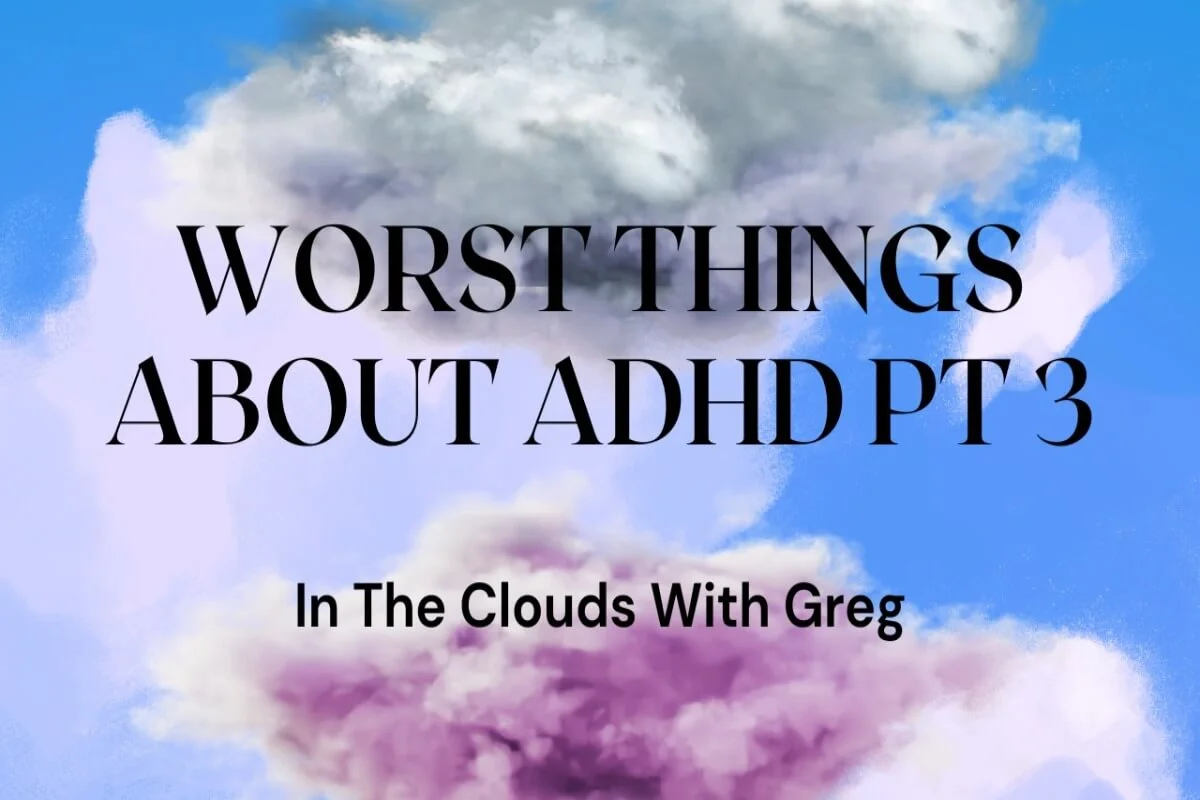Worst Things about ADHD Part 3
ADHD Worst Things Wrap Up Today, I conclude my discussion…
ADHD Worst Things Wrap Up
Today, I conclude my discussion on some of the worst challenges that people with Attention Deficit Hyperactivity Disorder (ADHD) often encounter in daily life, such as Fear of missing out (FOMO) It is important to shed light on these difficulties in order to foster understanding, empathy, and support for those navigating through the complexities of this neurodevelopmental disorder. By delving deeper into these challenges, we can gain a more comprehensive understanding of the impact that ADHD has on people’s lives and contribute to a more inclusive and accommodating society.
So, without further ado, let us embark on this enlightening journey of exploration and awareness. But before we begin…..
A Minute in the Clouds With Greg Day 27
Welcome to another installment of a minute in the clouds with me, Greg! If you enjoy these videos and articles, please consider subscribing to the channel and newsletter. Leave a comment with any feedback on what content you have enjoyed the most. Let’s continue…..
Overthinking
Overthinking is common in people with ADHD. It involves excessive dwelling on thoughts, which can lead to increased worry and anxiety. Some people with ADHD may also experience intrusive thoughts, which are unwanted and repetitive thoughts that can be distressing. These thoughts can last for a long time and may contribute to negative self-talk, leading to depression or anxiety. Seeking support from mental health professionals can help manage these thought patterns.
Difficulty in Setting Boundaries
Setting boundaries is a significant challenge for individuals with ADHD. Unlike neurotypical individuals, they struggle to define and enforce their personal boundaries, leading to issues such as being taken advantage of and excessive stress. Difficulties with self-regulation, including task prioritization, time management, and saying no, contribute to this challenge. Impulsivity also plays a role, making it difficult to establish firm boundaries. To overcome these issues, practicing assertiveness, learning to say no effectively, and seeking support from understanding friends or therapists can be helpful. These strategies help establish healthy boundaries for their well-being.
ADHD and Need for Constant Stimulation
ADHD is characterized by a need for constant stimulation, which can lead to exhausting and harmful behaviors. This constant search for novelty can drive someone to seek new experiences, take risks, and explore their creative side. However, this insatiable desire can also have negative consequences, such as difficulty completing repetitive tasks, straining interpersonal relationships, and predisposing someone to addiction tendencies.
Thy may turn to substances like drugs or alcohol to satisfy the craving for excitement and novelty, and engage in impulsive activities without considering potential risks. It is important to find healthy outlets for stimulation through hobbies, physical activities, or engaging careers that keep them mentally engaged without causing a destructive path.

Struggle With Routine Tasks and ADHD
People with ADHD can have a hard time with routine tasks because they are repetitive and boring. These tasks can limit creativity and independence, making them crave excitement. They also require focus and attention to detail, which is difficult for those with ADHD. For example, activities like cooking or cleaning can be tough to stay focused on because of distractions and racing thoughts. This can drain their energy and mental resources. Creating a routine can help them stay on track and be more productive.
Chronic Lateness and ADHD
Chronic lateness is a common issue for people with ADHD, as they struggle with managing time and maintaining structure in their lives. Overwhelmed by multiple tasks and responsibilities, it can be a struggle to prioritize and allocate time effectively. Impulsivity can also contribute to chronic lateness. Understanding this distinction can help foster empathy and support for those struggling with punctuality.
Strategies like setting reminders, establishing routines, and breaking tasks into manageable chunks can help overcome this cycle and minimize its impact on both individuals and those around them.
Difficulty Reading Social Cues and ADHD
People who have ADHD can face challenges in reading social cues, which seem like a foreign language. This can lead to misunderstandings, awkward moments, and strained relationships. ADHD can also impair focus and attention to details, making us vulnerable to miscommunication and potential conflicts. This difficulty in reading social cues often leads to feelings of overwhelm and anxiety, as we can question others’ authenticity and become overly sensitive to criticism. This can contribute to feelings of isolation and can impact daily life.
Financial Challenges
People with ADHD often struggle with finances because of impulsive behavior, trouble focusing, and poor money management skills. They have a hard time sticking to budgets and saving money for the future, which can negatively impact financial stability. They may also experience job instability, lower earnings, and higher unemployment rates, making their financial situation even more difficult.
Financial planners and therapists can help to develop effective strategies for managing money that are tailored to their needs. Society should recognize and support these challenges by providing resources and accommodations to help +navigate the complex world of finance more successfully.

Sensation Seeking and ADHD
ADHD is often linked to seeking excitement. People with ADHD are more likely to take risks and seek intense experiences. This can lead to impulsive actions, reckless driving, or substance abuse. However, not all seeking of excitement is bad. Some people find positive outlets for their need for stimulation, such as extreme sports or creative activities.
They thrive in challenging situations and enjoy new experiences. By understanding this aspect of ADHD, we can appreciate the strengths it brings, alongside the challenges. By providing safe opportunities for engaging experiences, we can help individuals with ADHD channel their excitement in healthier ways and minimize risks and negative consequences.
ADHD and Difficulty With Self-Regulation
ADHD can make it hard to control yourself. People with ADHD might make impulsive decisions, struggle with time management, and have difficulty focusing on tasks. Some days, people with ADHD can stay on task and control their impulses well. Other days, they might struggle to pay attention and get things done. Society often misunderstands ADHD as laziness or lack of discipline, making it even harder for people with the disorder to succeed. We need to recognize that ADHD is a real condition and support those who have it instead of judging them.
Fear of Missing Out (FOMO) And ADHD
Fear of missing out (FOMO) and imposter syndrome can be related. Imposter syndrome is a psychological phenomenon where people doubt their skills and accomplishments and fear being exposed as frauds. FOMO is the feeling of missing out on information, events, or experiences that could make life better.
FOMO can trigger anxiety and compulsive behaviors, like checking sites to maintain social connections. It can also lead to spending more money in social situations to compensate.
Research has found a connection between FOMO and mental health. FOMO has been positively correlated with depression and anxiety.
Fear of missing out (FOMO) and imposter syndrome can be especially difficult for people with ADHD. FOMO can cause people to compare themselves to others and feel inadequate if they don’t keep up. People with ADHD may already feel inadequate, so FOMO can magnify these feelings.
Imposter syndrome can also be overwhelming for people with ADHD. People with ADHD may hyperfocus on certain tasks or interests, but struggle to focus on others. This can lead to feelings of being a fraud.

ADHD and Emotional Sensitivity
ADHD can lead to increased emotional sensitivity, making small setbacks and criticism feel like personal attacks. This can cause self-doubt and insecurities, as some people can struggle to separate their emotions from objective reality. The hyper-awareness allows them to empathize deeply with others, but also leaves them vulnerable to overwhelming emotions.
Recognizing and supporting emotional sensitivity is crucial for creating a safe environment for people to express their feelings without fear of judgment or dismissal. Empathy and compassion can help mitigate the negative impact of emotional sensitivity and promote greater acceptance and well-being for all involved. To improve emotional regulation with ADHD:
- Get enough sleep
- Eat regular and healthy meals
- Exercise
- Get outside in daylight
What Am I Grateful for Today?
Today, I am grateful for my “Creative Work Hour Family.” I honestly would be lost without this amazing group of people who come from all walks of life and from around the globe. We gather together as friends and family, supporting and encouraging one another. It is truly remarkable and special.

What Are You Grateful for Today?
Let me know in the comments along with what content or topics you are enjoying the most. As always, thank you for watching. I love you all!
I hope you enjoyed today’s content. See you tomorrow, and remember:
TAKE CARE OF YOUR MIND!
